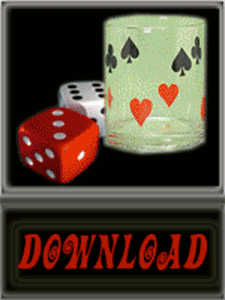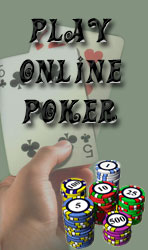Pokerwiner.com → Lessons of poker
The Betting Rules
Some of the questions you should ask before sitting down to play are: Is check-raising allowed? Is a flat bet imposed, or is there variable betting? In seven card stud, does the low card bring it in or the high card? How many raisers are allowed? Does the player who opens the pot have to bet first next rounds?
Whatever the rules, you should be thoroughly familiar with them before you sit down to play.
Don’t make the mistake a friend of mine made the first time he ever played draw poker in Gardena.
He is the only man I know who made a royal flush but lost the hand.
In Gardena you need jacks or better to open, and a joker is used as a bug.
That is, the joker may be used with straights, flushes, and aces; it cannot be used to make a pair except with aces.
My friend N.S. bought into a $2-$4 draw poker game for $40, and the first hand he picked up was an ace-high straigh:





He was in third position behind the dealer. The man under the gun checked, the second man checked, and N.S. gleefully bet $2.
Everyone behind him folded, but then bang! The man in first position raised, and the man in second position reraised. Stupefied, N.S. called the double raise, and the first raises.
When it came time to draw cards, the first man stood pat. The second man stood pat. N.S.
Was smart enough to realize his straight was beat, if not by the man in first position, certainly by the man in second position.
So he cleverly discarded the ace of clubs to draw to a straight flush in hearts or any kind of flush, since with the joker he’d have an A, Q high.
Drawing to 10 ![]() J
J ![]() Q
Q ![]() JK, N.S. actually had four cards that would make the straight flush the 8
JK, N.S. actually had four cards that would make the straight flush the 8 ![]() , 9
, 9 ![]() , K
, K ![]() , and A
, and A ![]() .
.
When he looked at the card he’d drawn, there it was – the king of hearts! He’d made a royal flush, the pure nuts of pure nuts.
The man in second position bet. N.S. raised. The man in first position called.
The man in first position eventually folded his jack-high flush, out the reraising continued until the entire $40 with which N.S.
bought into the game was in the pot. The second player turned over a full house – kings full of 9s.
With a broad smile N.S. revealed his royal flush.
He was about to gather in the pot when his opponent asked, “Where are your openers?”
“Openers?” N.S. said. “I had a straight.”
“But you drew one card,” said his opponent. “You don’t have openers.”
Remember that in Gardena card rooms you need jacks or better open. The joker can be used only with aces, straights, and flushes. Since N.S.
Had thrown away his ace of clubs and had indeed drawn one card to make the royal, he had no proof whatsoever that he had opened with a legal opening hand.
Of course, there’s a posted rule in Gardena card rooms to cover such situations: “When splitting openers, player must declare same and protect split card by turning it face up under a chip.” N.S. had not informed himself of this rule, his royal flush was declared dead, and the full house won the pot odds.
Beyond knowing the rules, it’s important to use them to your advantage as the man in Gardena with the full house certainly did.
However, here we’re not talking about exploiting technicalities but rather adjusting your play to suit the rules of the game. Suppose, for example, the game does not allow check-raising.
Well, that rule takes away a very effective tool, which presumably you can use better than other players in the game. But it changes your playing strategy in that it gives more power to the player in last position.
Therefore, when you are in last position, you must bet quite a lot more since you are no longer putting yourself in jeopardy of a check-raise.
You would semi-bluff more on earlier rounds because the worst that could happen would be that you’d get called – not raised.
Even in first position you must bet more often than you ordinarily would since you can’t check-raise. (However, against tough players it may be still better to check and call, rather than bet out with a very good hand in first position, because you may induce them to bet with a hand they would have folded if you had bet.)



